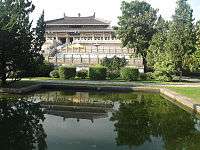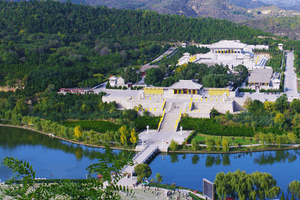Yan Huang Zisun
Yan Huang Zisun (Chinese: 炎黃子孫; literally: "Descendants of Yan and Huang") is a term that represents the Chinese people, most notably the Han. Today, the Chinese people still refer to themselves with this term.[1]
Yandi (炎帝) and Huangdi (黃帝) are both legendary ancestors of the Huaxia people.[2] Legend has it they are both part of the Yanhuang tribe.[3] They were enemies who fought each other in the Battle of Banquan.[3] Huangdi defeated Yandi and the two peoples amalgamated and eventually became the Huaxia people, who in turn developed into the Han Chinese, the dominant ethnic group in China. Huangdi is revered as the founder of the Chinese civilization.[4]
Modern usage
The derivation of the term is mentioned as Yan Huang Shizhou (炎黃世冑) in the National Flag Anthem of the Republic of China, officially translated in English as "Descendants of Yan and Huang".
Ma Ying-jeou, President of the Republic of China, has used this term to refer to all Chinese people.[5]
See also
References
- ↑ Law, Eugene (2004). Intercontinental's best of China. Beijing: China Intercontinental Press. p. 10. ISBN 978-7-5085-0429-2.
- ↑ 戴逸, 龔書鐸. [2002] (2003) 中國通史. 史前 夏 商 西周. Intelligence press. ISBN 962-8792-80-6. p 33.
- 1 2 戴逸, 龔書鐸. [2002] (2003) 中國通史. 史前 夏 商 西周. Intelligence press. ISBN 962-8792-80-6. p 32.
- ↑ Veith, Ilza. [2002] (2002). The Yellow Emperor's Classic of Internal Medicine. University of California Press. ISBN 0-520-22936-3, ISBN 978-0-520-22936-5. pg 5-6.
- ↑ Ko, Shu-ling (Oct 29, 2010). "'1992 consensus' is basis of ties: Ma". Taipei Times. p. 3. Retrieved 25 October 2011.

